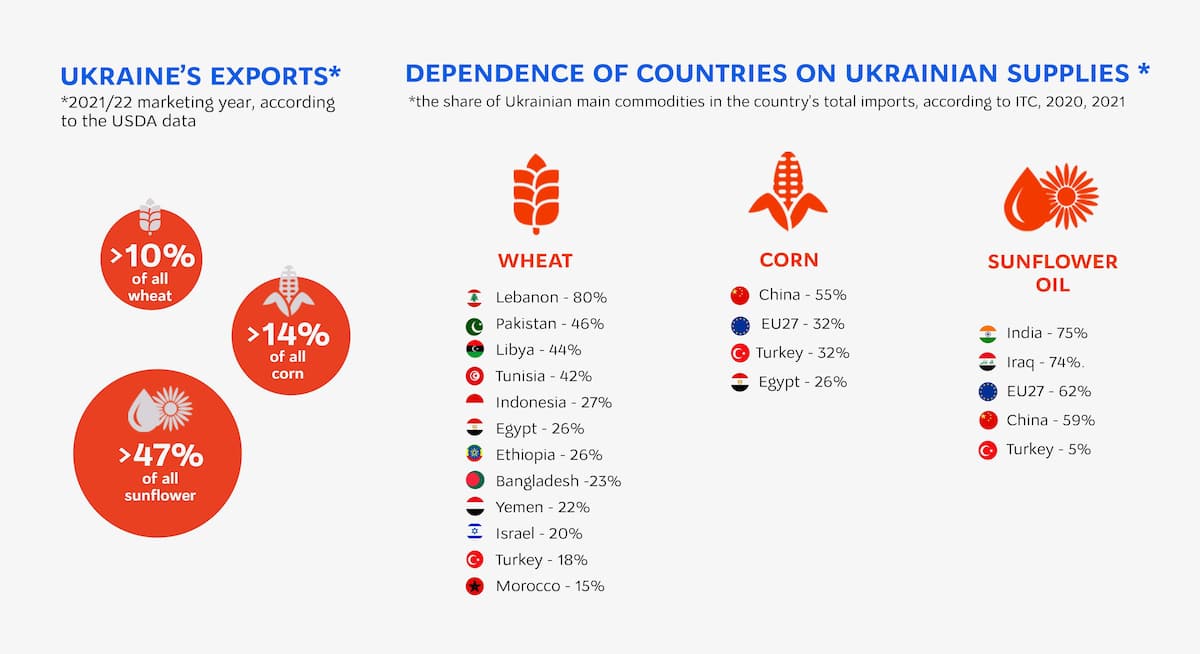Ukraine Tells Nigeria, African Countries to be Careful Buying Russia's 'stolen' grain as war enters 120 days
- Ukraine's government has asked Nigeria and other African countries to be careful about buying grains from Russia as it claims most are stolen.
- It's been 42 days since the Russia, Ukraine war began and Africa has been severely hit due to heavy dependence on food imports from Russia, Ukraine
- Since the start of the war, Ukraine has only been able to export 1.5 million to 2 million tons of grain a month, down from more than 6 million tons
PAY ATTENTION: Click “See First” under the “Following” tab to see YEN.com.gh News on your News Feed!
Ukraine’s foreign minister, Dmytro Kuleba, has urged Nigeria and African countries to be careful about buying grains from Russia.
According to Kuleba most of the grains sold by Russia are Ukrainian grain which he said were stolen from occupied territories in Luhansk, Donetsk, Kherson, and Zaporizhzhia regions of Ukraine.
He made this plea during an online briefing to African journalists on Thursday attended by YEN.com.gh.

Source: Facebook
Kuleba’s briefing is coming at a time Nigeria is suffering heavily from an increase in the price of wheat.
PAY ATTENTION: check out news exactly for YOU ➡️ find "Recommended for you" block and enjoy!
Speaking to journalists, Ukraine's Foreign Minister also denied claims that his country is withholding grains to get more sanctions for Russia.
He added:
"Ukraine normally provided 10% of the world’s wheat, 14% of its corn and 47% of its sunflower oil. In Africa, 44% of Libya’s wheat, 42% of Tunisia’s wheat, 26% of Egypt’s wheat, 26% of Ethiopia’s wheat and 15% of Morocco’s wheat came from Ukraine. Just over a quarter of Ukraine’s food exports were to Africa.
“And trust me, we have no intention of shooting ourselves in the foot by withholding the export of our agricultural products to the global market. We want to export our agricultural products to you as badly as you want to receive them"
He also noted that the blocking of his main port by Russia is making it difficult to trade.
“Ninety percent of that was exported from ports in the Black Sea and Azov Sea. Now, Russia was blocking 57 commercial vessels loaded with agricultural produce in the Black Sea and much more produce stored in the ports.”
Africa buying Russian grains
Furthermore, in its presentation, Kuleba revealed that Ukraine exported between five and six million tonnes of agricultural produce monthly but this has changed since the start of the war on 24 February 2022.
Kuleba also added that Moscow was worried its friendly relations with many African nations might now be jeopardised by the food crisis it had caused.
He said:
“What we expect from other countries are two things, Do not buy stolen Ukrainian grain. And respect the fact that we were always reliable suppliers for you. Help us to solve the existing problem and we will continue trading with you on good terms.
“We clearly see a strategy of the Russian Federation to replace Ukraine on our traditional markets. We clearly see ships, vessels, taking stolen Ukrainian grain to countries like Syria or to Russia and then being exported further without a clear indication of where this grain comes from.”
Russia-Ukraine War: Economic effects hit Ghanaians hard
In another story, YEN.com.gh reported that since March 2022, the government of Ghana has not missed an opportunity to remind citizens that the Russia-Ukraine War was decimating the economy.
Food inflation, high cost of fuel, and depreciating cedi, the key drivers of hardship in the country, have all been linked to the war.
Before the war, however, Ghana like many countries in Africa, was reeling under the weight of hardships caused by the global pandemic. In fact, by March 10, the World Bank said Ghana was at high risk of debt distress.
PAY ATTENTION: check out news exactly for YOU ➡️ find "Recommended for you" block and enjoy!
Source: Legit.ng




